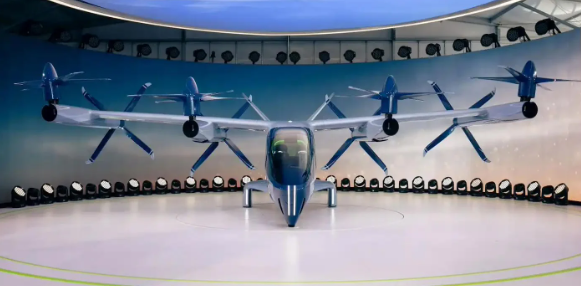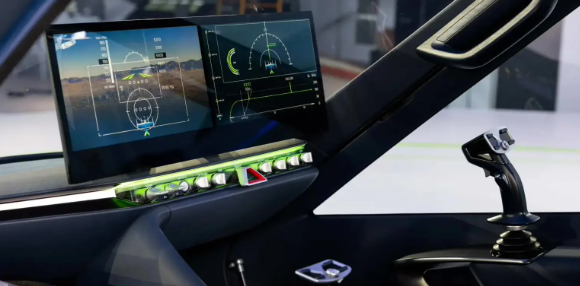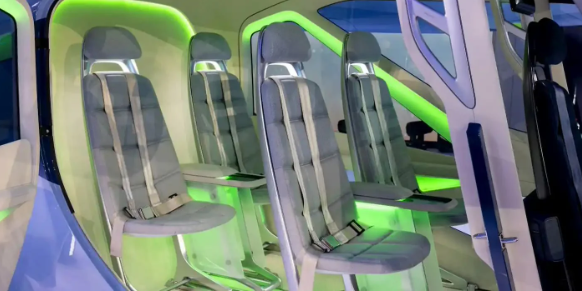 Technology peripherals
Technology peripherals
 It Industry
It Industry
 Supernal launches S-A2 electric flying taxi, expected to enter commercial operation in 2028
Supernal launches S-A2 electric flying taxi, expected to enter commercial operation in 2028
Supernal launches S-A2 electric flying taxi, expected to enter commercial operation in 2028
News on January 10, at the CES held recently In 2024, Hyundai Motor subsidiary Supernal unveiled the mystery of its new electric flying taxi S-A2.
This electric flying car named S-A2 has attracted a lot of attention with its unique V-shaped tail design. It can soar at up to 1,500 feet in the air at speeds of 120 miles per hour, providing passengers with a smooth intercity travel experience of 25 to 40 miles. Through its innovative electric technology, the S-A2 is not only able to reduce its reliance on traditional fuels, but also reduces its impact on the environment, becoming a powerful solution for future urban transportation.

It is understood that Supernal plans to conduct an initial test flight of an electric air taxi before the end of 2023. To achieve this goal, Hyundai plans to apply for an airworthiness certificate from the United States in mid-2024. Once all testing and safety requirements are passed, Supernal plans to officially launch commercial services in 2028.

The S-A2 is equipped with eight tilt rotors and an advanced distributed electric propulsion system, making it outstanding in terms of technical details. Through the use of these technologies, the flying taxi can control the noise level below 65 decibels during vertical takeoff and landing. In cruising mode, the noise level is further reduced to 45 decibels. This technological breakthrough allows Supernal to proudly claim that the S-A2 will operate as quietly as a dishwasher.

Supernal Chief Technology Officer Ben Diachun emphasized that the design of the S-A2 makes full use of the latest electric platform technology advancements to improve performance and efficiency. At the same time, Hyundai will make full use of its vast production network to efficiently manufacture the S-A2, thereby ensuring product quality while reducing costs.
In addition, Hyundai Motor Group President and Supernal CEO Jaiwon Shin revealed in an interview with the media that the company is actively studying different battery technology options, including cutting-edge technologies such as lithium metal batteries and solid-state batteries, aiming to provide In the future, electric flying taxis will provide stronger power support. These new battery technologies are expected to improve the endurance and charging speed of electric flying taxis, thereby further promoting the development of electric air transportation. Not only that, Hyundai Motor also plans to increase the use of renewable energy to reduce the carbon emissions of electric flying taxis. These efforts will bring
to the future of urban transportationThe above is the detailed content of Supernal launches S-A2 electric flying taxi, expected to enter commercial operation in 2028. For more information, please follow other related articles on the PHP Chinese website!

Hot AI Tools

Undresser.AI Undress
AI-powered app for creating realistic nude photos

AI Clothes Remover
Online AI tool for removing clothes from photos.

Undress AI Tool
Undress images for free

Clothoff.io
AI clothes remover

AI Hentai Generator
Generate AI Hentai for free.

Hot Article

Hot Tools

Notepad++7.3.1
Easy-to-use and free code editor

SublimeText3 Chinese version
Chinese version, very easy to use

Zend Studio 13.0.1
Powerful PHP integrated development environment

Dreamweaver CS6
Visual web development tools

SublimeText3 Mac version
God-level code editing software (SublimeText3)

Hot Topics
 Hyundai Motor will debut at the 2024 Beijing Auto Show with many of its models
Apr 26, 2024 pm 06:49 PM
Hyundai Motor will debut at the 2024 Beijing Auto Show with many of its models
Apr 26, 2024 pm 06:49 PM
On April 25, 2024, the 18th Beijing International Automobile Exhibition officially kicked off. At this auto show, Hyundai Motor not only announced its electrification blueprint to further promote the transformation of its electrification business in China, but also announced the Chinese version of the N brand's first mass-produced high-performance electric vehicle, IONIQ (Ani Krypton) 5N, opening a new chapter in high-performance A new chapter in the development of electrification. At the same time, Beijing Hyundai also released the fifth-generation Santa Fe, bringing a further upgraded multi-scenario travel experience. At this auto show, Hyundai Motor presented the high-performance hydrogen fuel cell hybrid concept car NVision74, the first N-brand mass-produced model introduced to the Chinese market, the new Elantra N and its high-performance kit modified version, the new Elantra N1 regulation racing car and IONIQ
 Exclusively for Disney fans! Hyundai IONIQ 5 Platinum Collector's Edition is on sale in limited quantities, with a starting price of approximately 428,000 yuan
Mar 02, 2024 pm 03:20 PM
Exclusively for Disney fans! Hyundai IONIQ 5 Platinum Collector's Edition is on sale in limited quantities, with a starting price of approximately 428,000 yuan
Mar 02, 2024 pm 03:20 PM
In order to celebrate the centenary of Disney, Hyundai Motor and Disney DreamWorks collaborated to launch a unique limited edition model - Hyundai IONIQ5 Disney100 Platinum Collector's Edition. This specially customized model not only shows the century-old charm of Disney, but also highlights the outstanding strength of modern automobiles in technological innovation and design aesthetics. It is understood that this IONIQ5 Disney100 Platinum Collector's Edition model uses a unique "Stardust Gold Matte" paint, with 20-inch exclusive alloy wheels and black modern car logos, showing a unique temperament. The specially designed "Disney 100 Platinum Edition" badges and unique raffia on both sides of the car body highlight its distinguished status as a limited edition. Complete
 Supernal launches S-A2 electric flying taxi, expected to enter commercial operation in 2028
Jan 10, 2024 pm 12:02 PM
Supernal launches S-A2 electric flying taxi, expected to enter commercial operation in 2028
Jan 10, 2024 pm 12:02 PM
According to news on January 10, at the recently held CES2024, Supernal, a subsidiary of Hyundai Motor, unveiled the mystery of its new electric flying taxi S-A2. This electric flying car called S-A2 has attracted a lot of attention with its unique V-shaped tail design. It can soar at up to 1,500 feet in the air at speeds of 120 miles per hour, providing passengers with a smooth intercity travel experience of 25 to 40 miles. Through its innovative electric technology, the S-A2 is not only able to reduce its reliance on traditional fuels, but also reduces its impact on the environment, becoming a powerful solution for future urban transportation. It is understood that Supernal plans to launch in 2
 Hyundai and Kia's combined sales in the Indian market will exceed 9 million vehicles
Jul 18, 2023 pm 10:02 PM
Hyundai and Kia's combined sales in the Indian market will exceed 9 million vehicles
Jul 18, 2023 pm 10:02 PM
According to news on July 17, the editor recently learned that Hyundai Motor Group said it expects cumulative car sales in the Indian market to reach 9 million units later this year. According to Hyundai Motor's data, as of June 2023, the group's cumulative vehicle sales in the Indian market have reached 8.69 million vehicles, including 758,000 Kia Motors vehicles. Based on this trend analysis, it is expected that the cumulative sales of Hyundai and Kia in the Indian market will exceed 9 million vehicles in the fourth quarter of this year. At the same time, as of the first half of 2023, Hyundai and Kia's combined market share in the Indian market is 21.3%. Further analysis of previous official data shows that Hyundai Motor's global sales in 2022 will be 3.944579 units, an increase of 1.4% from 2021
 Hyundai Motor plans to invest 2 trillion won in building a factory in Ulsan to produce electric vehicles, with an annual production capacity of 200,000 vehicles
Nov 13, 2023 pm 12:45 PM
Hyundai Motor plans to invest 2 trillion won in building a factory in Ulsan to produce electric vehicles, with an annual production capacity of 200,000 vehicles
Nov 13, 2023 pm 12:45 PM
According to news from this website on November 13, Hyundai Motor announced today the opening of a new electric vehicle-specific factory in Ulsan and held a groundbreaking ceremony here. It is worth mentioning that more than 50 years ago, Hyundai Group’s founder and first chairman Zheng Juyong established the company’s first major production base here. According to reports, the project is expected to invest 2 trillion won (note on this site: currently about 11.08 billion yuan). Full construction will begin in the fourth quarter of 2023, and mass production will begin in the first quarter of 2026. The new factory covers an area of 548,000 m2 and has an annual production capacity of approximately 200,000 vehicles. The Genesis luxury electric SUV owned by Hyundai Group will be the first model produced in the new factory. Advertising statement: This article contains external jump links, such as hyperlinks, QR codes, passwords, etc., for the purpose of
 Saudi sovereign wealth fund and Hyundai Motor to spend more than $500 million to build car plant in Saudi Arabia
Oct 24, 2023 am 08:01 AM
Saudi sovereign wealth fund and Hyundai Motor to spend more than $500 million to build car plant in Saudi Arabia
Oct 24, 2023 am 08:01 AM
According to news on October 23, South Korean President Yoon Seok-yue said on Sunday local time that South Korea's Hyundai Motor Group will cooperate with Saudi Arabia's sovereign wealth fund (PIF) to build an automobile factory in Saudi Arabia. Yin Xiyue announced the above news in Riyadh, the capital of Saudi Arabia. PIF and Hyundai Motor signed an agreement to build a factory in Riyadh. A joint statement from both parties stated that the factory will have an annual production capacity of 50,000 electric vehicles and gasoline-powered vehicles and will become the first Korean automobile factory in the Middle East. It is reported that PIF will hold 70% of the new joint venture's shares, and Hyundai Motor will hold the remaining 30%. The total investment in the project will exceed US$500 million. Hyundai Motor Group, currently the world's third-largest auto group by sales, is starting to produce cars in Saudi Arabia. Saudi Arabia has been working hard to
 Hyundai Motor accelerates its electrification layout, and IONIQ 7 three-row SUV leads the future trend
Feb 21, 2024 pm 03:04 PM
Hyundai Motor accelerates its electrification layout, and IONIQ 7 three-row SUV leads the future trend
Feb 21, 2024 pm 03:04 PM
Hyundai Motor is about to make a splash in the electric SUV market. Its first electric three-row SUV, IONIQ7, will be unveiled at the Busan International Motor Show in June. This model is built on Hyundai Motor's unique E-GMP platform, demonstrating Hyundai Motor's ambition and strength in the field of electric vehicles. It is understood that Hyundai Motor has performed well in the electric vehicle market, and its IONIQ5 and IONIQ6 models are favored by consumers for their excellent performance and design. According to S&P Global, Hyundai ranked fourth in electric vehicle sales in the U.S. market last year, accounting for 4.5% of the market. Unlike rivals such as Ford and General Motors, which have slowed down electric vehicle production, Hyundai has shown strong momentum. In addition, Hyundai Motor also this year
 Hyundai Motor and BAIC Group strengthen cooperation in new energy field
Sep 13, 2023 pm 01:57 PM
Hyundai Motor and BAIC Group strengthen cooperation in new energy field
Sep 13, 2023 pm 01:57 PM
Beijing Hyundai held a Hi-Tech Super Technology Day event in Seoul, South Korea this morning. Hyundai Motor Group said that in order to cope with the rapid changes in China's new energy vehicle market, they will adopt a strategy of open cooperation with local Chinese companies. According to reports, the world's third largest automobile group is preparing to join hands with its Chinese partner BAIC Group to launch an electric brand , to strengthen cooperation in the field of new energy vehicles. In addition, Hyundai Motor is also actively seeking opportunities to cooperate with local power battery and software companies in China. In addition, Hyundai Motor Group is developing hydrogen fuel-powered vehicles in addition to electric vehicles. Last year, it built a hydrogen fuel cell system R&D and production base in Guangzhou, China. According to the latest data from this site, in August this year, BAIC Group delivered more than 140,000 new cars of various brands.





